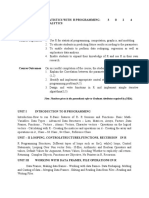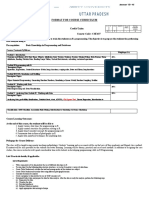7-R-Programming-Computer-Science-and-Applications-CCSA
Uploaded by
Nikita Hattewar7-R-Programming-Computer-Science-and-Applications-CCSA
Uploaded by
Nikita HattewarValue Added Add-On Course
DETAILED SYLLABUS
Title of the Course : R Programming
Course Code :
Nature of the Course : Value Added
Total Credits : 02
Distribution of Marks : 60 TH + 20 PR (End Sem) + 20 (In-Sem)
COURSE SUMMARY:
This course is designed to guide the learners through the fundamentals of R programming to
advanced analytics techniques. Designed to cater to both beginners and those with some
programming experience, the course offers a deep dive into R's powerful capabilities for statistical
analysis, data visualization, and predictive modeling. Through a blend of theoretical concepts,
hands-on exercises, and real-world case studies, learners will emerge with a robust understanding
of R programming and its applications in data analysis and beyond.
COURSE OBJECTIVES:
To introduce participants to the R programming language and its environment.
To equip learners with the skills to manipulate data, perform statistical analyses, and create
visualizations using R.
To provide insights into advanced data analysis techniques, including machine learning
algorithms within the R ecosystem.
To foster the ability to tackle real-world data problems and derive actionable insights using R.
To cultivate best practices in coding and data analysis workflows, ensuring reproducibility and
efficiency.
Total
UNITS CONTENTS L T P
Hours
1 Introduction to R Programming 02 01 03 6
(Marks) Overview of R and its IDEs (RStudio), Basics of R
12 TH + 4 PR
syntax and programming concepts,Data types,
variables, and operations in R.
2 Data Manipulation and Preparation 02 01 03 6
(Marks) Importing and exporting data in R, Data cleaning and
12 TH + 4 PR preparation with dplyr, Data transformation using
tidyr.
3 Data Analysis and Statistics 02 01 03 6
(Marks) Descriptive statistics and exploratory data analysis,
12 TH + 4 PR Hypothesis testing and inferential statistics, Regression
analysis and ANOVA.
4 Data Visualization with R 02 01 03 6
(Marks) Principles of effective data visualization, Introduction
12 TH + 4 PR to ggplot2 and advanced visualization techniques,
Creating interactive visualizations with packages like
plotly.
5 Advanced Analytics and Machine Learning 02 01 03 6
(Marks) Overview of machine learning in R, Classification,
12 TH + 4 PR regression, and clustering techniques, Model
evaluation and tuning.
Total (in Hrs) 10 05 15 30
Where, L: Lectures T: Tutorials P: Practicals (1P = 2 Hours)
MODES OF IN-SEMESTER ASSESSMENT: (20 Marks)
One Internal Examination - 10 Marks
Others (Any one) - 10 Marks
o Quiz
o Seminar presentation
o Assignment
LEARNING OUTCOMES:
After the completion of this course, the learner will be able to:
Demonstrate proficiency in R programming basics, including data types, functions, and
control structures.
Effectively manipulate and prepare data for analysis using packages like dplyr and tidyr.
Conduct comprehensive data analysis, including descriptive statistics, hypothesis testing,
and regression analysis, using R.
Create impactful visualizations with ggplot2 to communicate data insights clearly and
effectively.
Apply machine learning techniques to solve predictive modeling problems, using R
packages like caret and randomForest.
Develop and implement R scripts and functions to automate data analysis tasks, enhancing
productivity and ensuring reproducibility.
Navigate and contribute to the vibrant R community, leveraging resources and sharing
knowledge for continuous learning.
SUGGESTED READINGS:
1. N. Metzler, " R Programming for Beginners: An Introduction to Learn R Programming
with Tutorials and Hands-On Examples," Independently Published, 2019.
2. Fischetti, Tony, “ R: Data Analysis and Visualization,” Packt Publishing, 2016.
3. Lander, Jared. “R for Everyone: Advanced Analytics and Graphics,” Pearson
Education, 2017.
4. Singh, Ajit. “R Programming: Simply In Depth,” Amazon Digital Services LLC -
Kdp, 2020.
5. G. Grolemund, " R Programming An Approach to Data Analytics," Mjp Publisher,
2021.
**************
You might also like
- ST2195 Programming For Data Science: Course OutlineNo ratings yetST2195 Programming For Data Science: Course Outline14 pages
- BCA 3rd Sem TBC305(2) R Programming Jayashree Kulkarni-1No ratings yetBCA 3rd Sem TBC305(2) R Programming Jayashree Kulkarni-12 pages
- NAS1001_NASSCOM-FUTURE-SKILLS---ASSOCIATIVE-DATA-ANALYST_LTP_1.0_1_NAS1001_NASSCOM-FUTURE-SKILLS-ASSOCIATIVE-DATA-ANALYST_LTP_1.0_1_Associative Data Analyst (2)No ratings yetNAS1001_NASSCOM-FUTURE-SKILLS---ASSOCIATIVE-DATA-ANALYST_LTP_1.0_1_NAS1001_NASSCOM-FUTURE-SKILLS-ASSOCIATIVE-DATA-ANALYST_LTP_1.0_1_Associative Data Analyst (2)3 pages
- Course Code Course Title Course Planner: Through This Course Students Should Be Able ToNo ratings yetCourse Code Course Title Course Planner: Through This Course Students Should Be Able To6 pages
- Predictive Analytics With R CertificationNo ratings yetPredictive Analytics With R Certification1 page
- Course Title: Computing With R (Module 1)No ratings yetCourse Title: Computing With R (Module 1)2 pages
- GG 615 L P R, R, R P: Iterate Rogramming With Studio AND Markdown UrposeNo ratings yetGG 615 L P R, R, R P: Iterate Rogramming With Studio AND Markdown Urpose2 pages
- Introduction To R and Rstudio, R Script, Calling Functions, Running CodeNo ratings yetIntroduction To R and Rstudio, R Script, Calling Functions, Running Code10 pages
- Bcse207l - Programming-For-Data-Science - TH - 1.0 - 71 - Bcse207l - 66 AcpNo ratings yetBcse207l - Programming-For-Data-Science - TH - 1.0 - 71 - Bcse207l - 66 Acp2 pages
- Professional Certificate in Data ScienceNo ratings yetProfessional Certificate in Data Science15 pages
- Business Analytics With R Online TrainingNo ratings yetBusiness Analytics With R Online Training10 pages
- Data Analysis with R_Course content.docxNo ratings yetData Analysis with R_Course content.docx4 pages
- Format For Course Curriculum: L T P/S SW/FW No. of Psda Total Credit UnitsNo ratings yetFormat For Course Curriculum: L T P/S SW/FW No. of Psda Total Credit Units3 pages
- EECS1520 Course Updated Proposal - Post-V2No ratings yetEECS1520 Course Updated Proposal - Post-V24 pages
- R Fast Track Guide - 86 Key Points Every Programmer from Other Languages Should MasterFrom EverandR Fast Track Guide - 86 Key Points Every Programmer from Other Languages Should MasterNo ratings yet
- Department of Artificial Intelligence and Data Science: Dab Panel MembersNo ratings yetDepartment of Artificial Intelligence and Data Science: Dab Panel Members36 pages
- ArtificiaI Intelligence CLASS 10 HALF YEARLY TEST Solutions For StudentsNo ratings yetArtificiaI Intelligence CLASS 10 HALF YEARLY TEST Solutions For Students4 pages
- A Presentation On "Deep Neural Network" Nikhil Sunil PatilNo ratings yetA Presentation On "Deep Neural Network" Nikhil Sunil Patil9 pages
- Apple Adoption of ChatGPT - Implications For Data & Energy Consumption-Nicholas AssefNo ratings yetApple Adoption of ChatGPT - Implications For Data & Energy Consumption-Nicholas Assef10 pages
- IMPACT OF AI ON TRADEMARK INFRINGEMENT AND ENFORCEMENT: A STUDY ON AI-DRIVEN MARKETING AND BRANDING STRATEGIES by GIRISH BHARADWAJNo ratings yetIMPACT OF AI ON TRADEMARK INFRINGEMENT AND ENFORCEMENT: A STUDY ON AI-DRIVEN MARKETING AND BRANDING STRATEGIES by GIRISH BHARADWAJ27 pages
- How To Accelerate AI With Apache AirflowNo ratings yetHow To Accelerate AI With Apache Airflow14 pages
- The Impact of AI in Digital marketing strategiesNo ratings yetThe Impact of AI in Digital marketing strategies76 pages
- Full Download Cognitive Science An Introduction to the Science of the Mind Bermudez J.L. PDF DOCX100% (9)Full Download Cognitive Science An Introduction to the Science of the Mind Bermudez J.L. PDF DOCX40 pages
- A Framework For Deprecating Datasets - Standardizing - Documentation-Identification and CommunicationNo ratings yetA Framework For Deprecating Datasets - Standardizing - Documentation-Identification and Communication14 pages
- 2024 and 2025 Python IEEE Deep Learning and Machine Learning Projects ListNo ratings yet2024 and 2025 Python IEEE Deep Learning and Machine Learning Projects List10 pages
- Present and Future of AI in Renewable Energy Domain : A Comprehensive SurveyNo ratings yetPresent and Future of AI in Renewable Energy Domain : A Comprehensive Survey28 pages
- Online Payments Fraud Detection DocumentationNo ratings yetOnline Payments Fraud Detection Documentation40 pages
- Intelligent Integration of IoT and CyberPhysical Systems Empowering The Next Generation of AIEnabled Smart Environments-2024-05!15!03-46No ratings yetIntelligent Integration of IoT and CyberPhysical Systems Empowering The Next Generation of AIEnabled Smart Environments-2024-05!15!03-4613 pages
- Artificial Intelligence and Healthcare: The Impact of Algorithmic Bias on Health Disparities 1st Edition Natasha H. Williams instant downloadNo ratings yetArtificial Intelligence and Healthcare: The Impact of Algorithmic Bias on Health Disparities 1st Edition Natasha H. Williams instant download46 pages
- Lecture_6_Hidden_Markov_and_Maximum_Entropy_ModelsNo ratings yetLecture_6_Hidden_Markov_and_Maximum_Entropy_Models28 pages
- Detecting False Alarms From Automatic Static Analysis Tools: How Far Are We?No ratings yetDetecting False Alarms From Automatic Static Analysis Tools: How Far Are We?12 pages

























































































